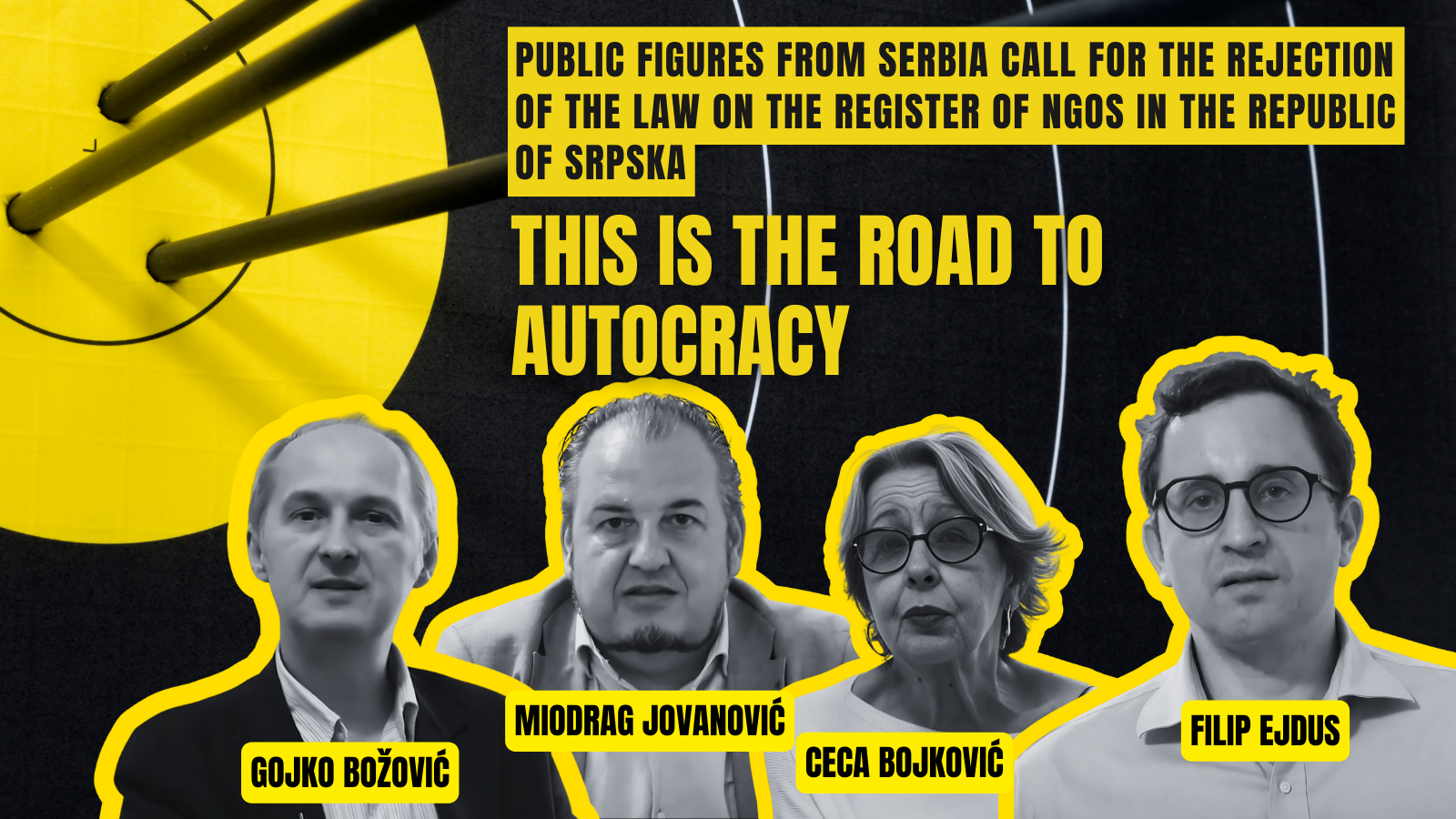Public figures from Serbia call for rejection of law on register of NGOs in Republika Srpska: The road to autocracy
Serbian actress Svetlana Ceca Bojković, writer and literary critic Gojko Bozović, and University of Belgrade professors Miodrag Jovanovic and Filip Ejdus sent a joint...

Serbian actress Svetlana Ceca Bojković, writer and literary critic Gojko Bozović, and University of Belgrade professors Miodrag Jovanovic and Filip Ejdus sent a joint message to the citizens of Republika Srpska regarding the adoption of the so-called “foreign agents law” that is on the agenda of the RS National Assembly.
They warned that this is the way the government is trying to suppress basic civil liberties and endanger the media and citizens’ associations that are not under the control of the authorities.
I think that this law is very dangerous because in this way the rights of citizens are abolished. The state as we know it exists to serve the citizens. Associations are a great help to citizens in achieving their civic goals, their everyday goals so to speak. Politics is involved in this now. This is the path to autocracy, tightening government grip on all the social sferes, actress Svetlana Bojković said in a video message.
The governments are not against foreign money but are against political freedoms
Society should not be afraid of freedoms but should be afraid of a situation in which freedoms are suppressed. The Law on the Special Register of NGOs in the Republic of Srpska is actually a law on agents of foreign influence and is a tool to suppress freedoms in society, political and civil liberties, freedom of organization. That is why we believe that it is important to provide support to citizens and non-governmental organizations in the Republic of Srpska that have done many things for society in the past period, for citizens, for specific communities that the institutions themselves have not done, said Gojko Božović, writer, literary critic and essayist.
He adds that the government’s claims that the association financed from abroad serves foreign interests, because the government itself is financed from the same sources.
“We have a clear awareness that the biggest beneficiaries of foreign funds in our environment are actually governments. And we see that the government has nothing against foreign money if it controls that money. This shows that governments are not against foreign money but are against political freedoms and against all those who are not controlled by local authorities. Such a law should be rejected with a very strong gesture in public, Bozovic believes.
Miodrag Jovanovic, a professor at the Faculty of Law in Belgrade, also points out that the government’s thesis for which such a law is supposedly adopted is unsustainable because it is financed from the same sources.
“If there is an assumption that a government that takes money, say, from USAID to rebuild schools, does it somehow on the benefit of all citizens, I don’t see why there should be some assumption that when an association finances its activities from the same source, it does so for completely different purposes, for alleged lyrical or anti-national activities. Therefore, at this elementary level, the logic of this law is simply untenable and it only shows a kind of malicious tone that tries to supress up a different opinion, i.e. the opinion of all those actors in the society of Republika Srpska who are essentially critics of the current government and critics of any other subsequent government, Jovanovic said in the message.
He adds that this is the role of any civil society, i.e. the association of citizens who are founded with this goal because they would not legally define themselves as non-governmental organizations, therefore they are not made to blow the sails of the Government no matter what it does and does.
Legalization of censorship
Professor of the Faculty of Political Sciences in Belgrade, Filip Ejdus, believes that this law represents a serious blow to democracy and democracy, human rights and freedom of expression.
“If it comes to adoption, it will be the legalization of censorship and open hunting of dissenters in Republika Srpska. This law is not only contrary to the Constitution of Republika Srpska and the Constitution of Bosnia and Herzegovina, but also with elementary documents of the international community such as the European Convention on Human Rights and the Universal Declaration of Human Rights, Ejdus said in a video message.
These public figures, who are also the initiators of the Proclamation in Serbia and are gathered around the idea of building a society in which free and critical debate will be the norm, appeal to the Deputies of the National Assembly of the Republic of Srpska to reject this law and not to allow republika Srpska to find itself in the company of some other authoritarian and dictatorial states who have adopted a similar law.
Get involved
Stay tuned
Subscribe to our newsletter and receive periodic notifications about our, announcements, calls and activities via email.
Don't miss it
If you want to receive our announcements immediately after the publication, leave your e-mail address in the field below.



